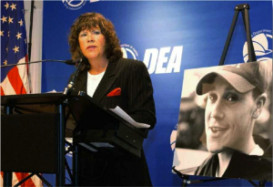
Giving people the Courage to Speak in Westford
By Joyce Pellino
Crane GateHouse News Service
March 30, 2013
Ginger Katz founded the Courage to Speak in 1996, just months after her 20-year-old son Ian James Eaccarino died of an accidental drug overdose. Katz is speaking at the Stony Brook Middle School, 9 Farmer Way, Tuesday, April 2 at 7 p.m. The Courage To Speak Foundation develops drug prevention curricula for elementary, middle and high school students as well as for parents through Courage to Speak — Courageous Parenting 101. Katz speaks to parents and students of all ages. More information can be found at couragetospeak.org. The event is sponsored by Lowell General Hospital and the Westford Parent Connection.
Your story about Ian is so compelling. When did he start taking drugs?
Eighth grade, cigarettes, a sip of beer and pot to start.
What drugs did he use?
Prescription drugs, heroin. It was a progression. Actually he said it was a smorgasbord of drugs at school and if you didn’t have the money they would give it to you free.
Why do you think some kids fall prey to substance abuse?
Lots of reasons — to hide pain and to feel better. Students say they want an altered state instead of who they are or what they feel. In addition, (peer pressure) rather peer influence, curiosity, availability of drugs, friends using, stress, sadness. Escape problems, family conflict, trouble in school or with a boyfriend or girlfriend. Many young people and adults receive help too late. This is why early detection is so important.
What do you believe attracted Ian to drugs?
To feel better. Ian was a risk-taker and he hid his pain.
What kind of high school did he attend?
Ian graduated from Norwalk High School in Connecticut. It was a public school. He was accepted at the University of Hartford and in his junior year transferred his credits to the University of Connecticut in Stamford, Conn., close to Norwalk where we live so he could commute to school while working on his recovery.
Was he going to college when he passed away?
Yes, UConn. Ian passed away 10 days into his junior year. He was commuting to school from home. I found him in his room at 6 a.m. just before I was going out to run with a friend. My cries for help were heard two blocks away.
What kind of student was he?
Ian was a good student in high school. He was accepted at all the colleges to which he applied. Sophomore year of college Ian came home with honors from the university, begging for help and addicted. He wanted help.
What are the signs parents should look for?
Drop in grades, aggressive behavior, depression, fatigue, change of habits, change of friends, loss of interest in sports and enjoyable activities, truancy, evidence of drug paraphernalia, loss of weight, bulking up (steroids), lying, sadness, distancing.
What causes addiction?
Many things. Over-use of substance. It is individual. Everyone is different. One can get addicted very quickly even on the first try. It all depends on the person.
How does addiction impact families?
Wreaks havoc on the entire family, financially, emotionally and physically. Many parents are paying for drug rehabilitation instead of college. A college education is cheaper.
What’s the code of silence and its dangers?
I call it the conspiracy of silence. Keeping secrets and not talking about feelings.
Keep silent when you are in trouble or you know someone else is in trouble. Have the courage to speak because its OK to ask for help.
What risky behaviors should parents watch for?
Staying out late, not coming home at all, change of behaviors, aggressive behavior, change of habits, truancy, evidence of drug paraphernalia, lying, driving the car fast, alcohol and other drug use, driving under the influence, skipping school, stealing.
How does a community prevent substance abuse?
1. The number one deterrent for keeping your child safe from drug use is talking to them about the dangers of drugs. Only one in three parents talk to their children about this topic. It is not a one-time conversation but rather an ongoing discussion. And my presentation starts the conversation and connects the parent and child. Perfect time for a discussion.
2. Teach drug prevention curriculum in schools at every level and early, community drug- free family nights. Entire community comes together to celebrate drug free children, speakers. Don’t enable.
4. Find out everything that your children will be exposed to even if you think your child will never use drugs. According to the American Pediatric Association: One out of five children have been drunk by the fifth grade. Eighty percent of high school students report using alcohol. Knowledge can save a life. Be convinced that drug use for children is life threatening. Visit couragetospeak.org

Ginger Katz looks at a photo of her late son, Ian, who died in
1996 at age 20 of an accidental drug overdose.
COURTESY PHOTO






